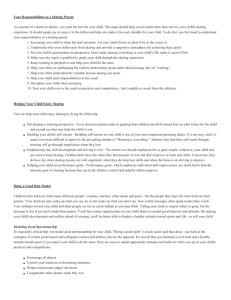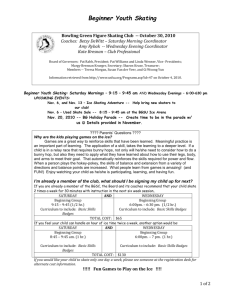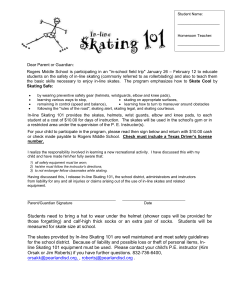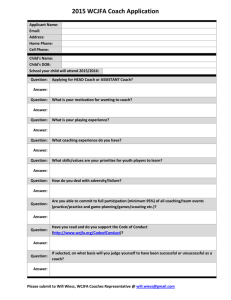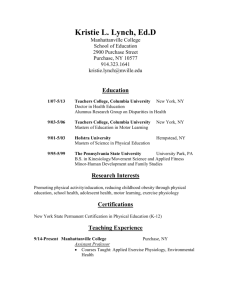Your Responsibilities as a Skating Parent
advertisement
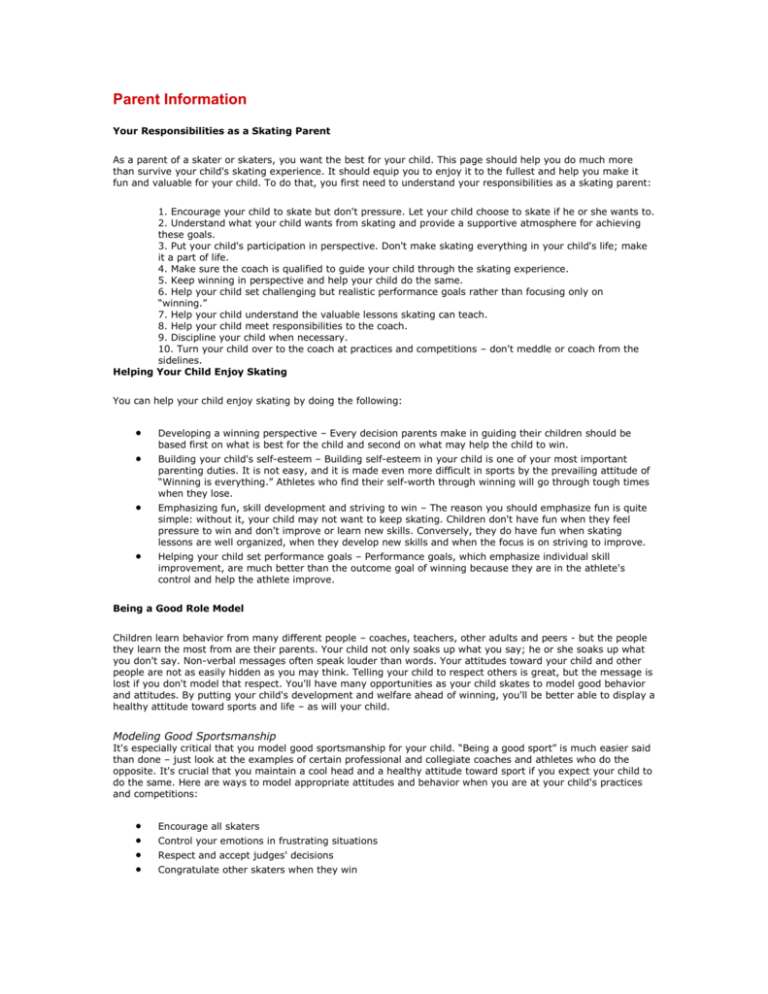
Parent Information Your Responsibilities as a Skating Parent As a parent of a skater or skaters, you want the best for your child. This page should help you do much more than survive your child's skating experience. It should equip you to enjoy it to the fullest and help you make it fun and valuable for your child. To do that, you first need to understand your responsibilities as a skating parent: 1. Encourage your child to skate but don't pressure. Let your child choose to skate if he or she wants to. 2. Understand what your child wants from skating and provide a supportive atmosphere for achieving these goals. 3. Put your child's participation in perspective. Don't make skating everything in your child's life; make it a part of life. 4. Make sure the coach is qualified to guide your child through the skating experience. 5. Keep winning in perspective and help your child do the same. 6. Help your child set challenging but realistic performance goals rather than focusing only on “winning.” 7. Help your child understand the valuable lessons skating can teach. 8. Help your child meet responsibilities to the coach. 9. Discipline your child when necessary. 10. Turn your child over to the coach at practices and competitions – don't meddle or coach from the sidelines. Helping Your Child Enjoy Skating You can help your child enjoy skating by doing the following: Developing a winning perspective – Every decision parents make in guiding their children should be based first on what is best for the child and second on what may help the child to win. Building your child's self-esteem – Building self-esteem in your child is one of your most important parenting duties. It is not easy, and it is made even more difficult in sports by the prevailing attitude of “Winning is everything.” Athletes who find their self-worth through winning will go through tough times when they lose. Emphasizing fun, skill development and striving to win – The reason you should emphasize fun is quite simple: without it, your child may not want to keep skating. Children don't have fun when they feel pressure to win and don't improve or learn new skills. Conversely, they do have fun when skating lessons are well organized, when they develop new skills and when the focus is on striving to improve. Helping your child set performance goals – Performance goals, which emphasize individual skill improvement, are much better than the outcome goal of winning because they are in the athlete's control and help the athlete improve. Being a Good Role Model Children learn behavior from many different people – coaches, teachers, other adults and peers - but the people they learn the most from are their parents. Your child not only soaks up what you say; he or she soaks up what you don't say. Non-verbal messages often speak louder than words. Your attitudes toward your child and other people are not as easily hidden as you may think. Telling your child to respect others is great, but the message is lost if you don't model that respect. You'll have many opportunities as your child skates to model good behavior and attitudes. By putting your child's development and welfare ahead of winning, you'll be better able to display a healthy attitude toward sports and life – as will your child. Modeling Good Sportsmanship It's especially critical that you model good sportsmanship for your child. “Being a good sport” is much easier said than done – just look at the examples of certain professional and collegiate coaches and athletes who do the opposite. It's crucial that you maintain a cool head and a healthy attitude toward sport if you expect your child to do the same. Here are ways to model appropriate attitudes and behavior when you are at your child's practices and competitions: Encourage all skaters Control your emotions in frustrating situations Respect and accept judges' decisions Congratulate other skaters when they win Checklist for Success Can you share your son or daughter? This means trusting the coach to guide your child's skating experiences. You must be able to accept the coach's authority and the fact that he or she may gain some of the admiration that once was directed solely toward you. Can you admit your shortcomings? Sometimes we slip up as parents, or experience emotions causing us to speak before we think. We judge our children too hastily, perhaps only to learn later that their actions were justified. It takes character for parents to admit when they make a mistake and discuss it with their children. Can you accept your child's disappointments? Sometimes being a parent means being a target for your child's anger and frustration. Accepting your child's disappointment also means watching your child skate poorly during a competition when all of his or her friends succeed, or not being embarrassed into anger when your 10-year-old breaks into tears after a disappointing performance. Keeping your frustrations in check will help guide your daughter or son through disappointments. Can you accept your child's triumphs? This sounds much easier than it often is. Some parents, not realizing it, may become competitive with their son or daughter, especially if the youngster receives considerable recognition. When a child skates well, parents may dwell on minor mistakes. Can you give your child some time? Some parents are very busy, even though they are interested in their child's participation and want to encourage it. Probably the best solution is never to promise more than you can deliver. Ask about your child's skating experiences and make every effort to watch at least some practices. Can you let your child make his or her own decisions? Decision making is an essential part of any young person's development, and it is a real challenge to parents. It means offering suggestions and guidance but ultimately, within reasonable limits, letting the child go his or her own way. All parents have ambitions for their children, but parents must accept the fact that they cannot mold their children's lives. Youth sports offer parents a minor initiation into the major process of letting go. Values Kids Learn Through Skating Your child can benefit greatly by participating in skating, but those benefits are not guaranteed. They are the result of a cooperative effort among local skating clubs, coaches, officials and parents. Those benefits come more readily when adults put the interests of children first and leave their own egos and desires about winning at home. Through skating your child can: Acquire an appreciation for an active lifestyle Learn to manage stress, perform under pressure, and test emotional and physical balance Develop self-esteem, self-confidence, self-discipline and self-reliance by mastering and performing skating skills Develop social skills with other children and adults Learn about managing success Coach Information Finding the Right Coach There are many factors involved in selecting a coach. Things to consider are personality, learning and teaching styles, experience and technical know-how. You know your child and have the best idea of who might make a good fit. Keep your child's personality and needs in mind when interviewing and selecting a coach. Characteristics of a Quality Coach A quality coach makes skating fun by being: Motivational Positive Encouraging Enthusiastic A quality coach fosters a positive environment for training by being: Knowledgeable Professional Educated Organized Punctual A quality coach prepares a child for testing and competing by being: Sensible Practical Polite Fair Respectful Calm Experienced For more information, please visit Athletes area of the web site.
